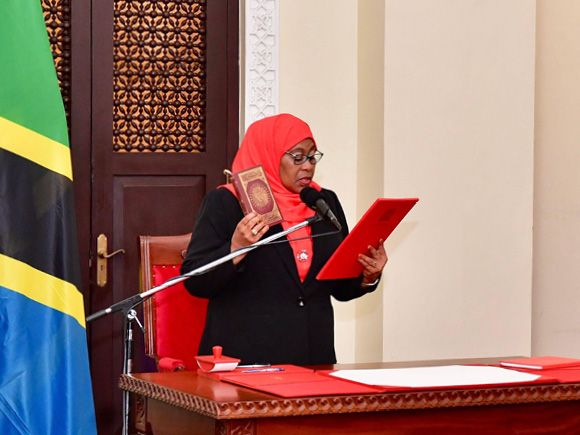On 17th March, Tanzania’s vice-president, Samia Suluhu Hassan, announced the sudden death of the country’s leader, John Pombe Magufuli. His death at 61 was attributed to a pre-existing heart condition, but opposition leaders claimed that the reliably prominent president had gone missing for a fortnight because he’d been laid low with Covid-19. Rumours, none confirmed, had the ill president flying abroad for treatment in, variously, neighbouring Kenya, South Africa, Germany or India.
Magufuli isn’t the only world leader to have contracted the virus or died from it, but his scepticism about the disease gave his case a special irony. In May last year, Magufuli declared that the country had beaten the virus through prayer, and commanded that authorities should stop registering cases and deaths. At the time, Tanzania had 509 cases and 21 deaths.
Nearby Uganda and Kenya took the opposite tack, imposing strict measures to combat the virus’s spread. But in Magufuli’s Tanzania, there were no rules about masks or social distancing and businesses stayed open—a gamble that made it the fastest-growing economy in Africa in 2020, but also led to untold deaths.
Meanwhile, tourists arrived in droves to Zanzibar—the semi-autonomous island off Tanzania’s coast—in special charter flights from Russia and Eastern Europe. Aside from the white beaches and turquoise water, the appeal for many was the lack of pandemic travel requirements—widely shared photos showed mask-free visitors basking in winter sun. However, another type of traveller was also to be found: western conspirators, convinced that George Soros or Bill Gates produced the pandemic to exert mass control, who saw Zanzibar as the last bastion of truth.
The situation on the ground has often resembled the “doublethink” of George Orwell’s Nineteen Eighty-Four, with every one denying the existence of Covid-19 even as they fretted about contracting it. In one bizarre press briefing Philip Mpango, the finance minister, reassured the public he was in good health while coughing, sweating and eventually breaking down in tears.
Even while Magufuli still lived and breathed there were high-profile casualties, including the vice-president of Zanzibar, Seif Sharif Hamad, who publicly confessed he had contracted Covid: two weeks later he died in hospital. Magufuli’s chief secretary, John Kijazi, was also suspected to be ill from the virus, although officially he suffered a “heart attack,” dying exactly one month before his boss.
And yet Tanzania’s health minister, Dorothy Gwajima, underlined that the country had no intention of procuring vaccines through the WHO’s Covax initiative, for which it is eligible. Instead she advocated steam inhalation and a combination of ginger, garlic and lemon to ward off any illness. The WHO director-general, Tedros Ghebreyesus, has aired deep concerns and implored the country to share health data.

Many believe that the deaths within government are only the tip of the iceberg, suggested by the country’s “pneumonia” spike. As late as March, a local journalist tells me, if someone was tested after showing Covid-like symptoms, their result was never disclosed. Instead, a health worker would tell the patient that they are “old enough” to know what they are suffering from, prescribe some medication and then send them home.
Under Magufuli’s regime, only three people were allowed to utter the c-word: the president, the health minister and the prime minister. Due to laws written during Magufuli’s first pre-pandemic tenure, anyone else could be jailed for pronouncing unofficial statistics. In the week before the president died, four people were arrested for circulating social media posts regarding his ill health.
Only the Catholic Church has so far defied the administration. Charles Kitima, general secretary of the Tanzania Episcopal Conference, announced that more than 25 priests and 60 nuns had died from a respiratory illness, while Archbishop Gervas Nyaisonga, president of the conference, rallied citizens to work on prevention, arguing it was better than any cure.
Now, hopes are pinned on Suluhu Hassan—the country’s first female leader—to take a new trajectory. Mama Samia, as she is affectionately called, was sworn in wearing a red hijab and black skirt suit co-ordinated to the ceremonial attire of the military. Opposition leaders hope that the popular 61-year-old will ease the crackdown on activists and journalists. But photographs of her first cabinet meeting show a roomful of maskless officials, raising questions about whether she will really walk a new path.
The new president will need to heal a polarised country, and decide whether to procure vaccines for Tanzania’s 58m people. Supporters say she is avoiding any controversial departure from her predecessor through the mourning period. Newly published guidelines hint at change. If so, the changing of the guard might prove to be, at the very least, the beginning of the end of a hidden tragedy.












